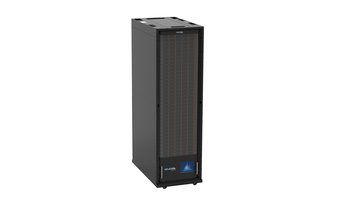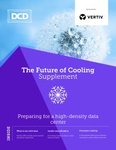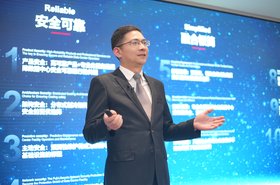Accelsius, a two-phase cooling company which is commercializing technology developed by Nokia's Bell Labs, is offering data center operators an on-site field trial of its system, which is due to launch next year.
In the new kickstart program, potential customers get a system rack incorporating Accelsius' NeuCool technology, in which dielectric coolant is allowed to boil in a circulating direct-to-chip system.
The arrangement is also a final beta test of Accelsius' product development. As well as giving field support to participants, the company says it is "looking for regular feedback on the NeuCool system's performance, which will inform future updates and improvements to the system’s cooling technology."
In an interview earlier this year, CEO Josh Claman told DCD that Accelsius was "lining up partnerships that will test the technology within their environments."
Following that, he told us: "We'll go into manufacturing in late Q4, and next year, we'll be taking orders."
The company opened a 15,000 sq ft manufacturing facility in Austin, Texas, earlier this year.
NeuCool is in an unusual niche in liquid cooling. Direct-to-chip systems usually rely on water, which has a high heat capacity, but Accelsius is using a dielectric coolant, and allowing it to boil in the circulating system, to remove more heat.
The benefit, according to Claman, is that leaks will not damage the electronics, and it can be fitted into standard rack designs, instead of requiring immersion tanks.
Accelsius acquired the technology from Nokia's Bell Labs, where it had been developed for five years, but not productized. No Bell Labs staff came to Accelsius, which has concentrated on productizing it and creating a cooling system suited to the demands of more widespread liquid cooling in data centers.
Currently, one of the biggest strikes against two-phase cooling systems is their use of PFAS, one of the poly-fluoroalkyl substances that have been the subject of increasing criticism over their possible health risks. A direct-to-chip system should minimize these concerns, he said.
"A lot of people are hesitant about two-phase immersion because they want reassurance about these chemicals," Claman told us. "Whereas in ours, it's a totally closed loop. It's not a tub, and it uses very little of the fluid. They're a little bit less concerned."
The two-phase cooling market was shaken up early this year when 3M pulled out of manufacturing Novec, the market-leading substance. Vendors have looked for alternatives from companies including Chemours.
Accelsius says it is still working on options, but appears to have settled on 1-Chloro-3,3,3-trifluoropropene, a PFAS that is still available form multiple vendors under the name R1233zd.
"The reality is we continue to evaluate and experiment with a variety of dielectric fluids which means we are engaged with several firms. While we can’t speak specifically yet about our collaborative R&D activities in this area, we can state that the initial release of our NeuCool 2Phase DTC System will be with Honeywell 1233zd."
Claman told DCD earlier this year that 1233 fluid "optimizes thermal performance with minimal PFAS, negligible global warming, and it's not flammable."
Claman says Accelsius will welcome participants' feedback, "as we fine-tune this transformational technology for a wide range of applications and use cases."




